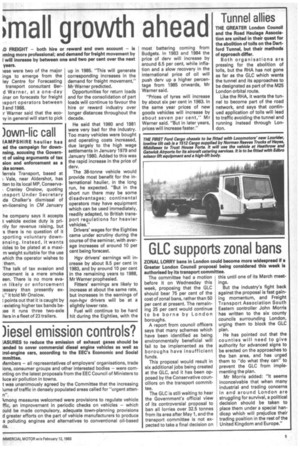hall growth ahead
Page 7

If you've noticed an error in this article please click here to report it so we can fix it.
iD FREIGHT — both hire or reward and own account — is )ming more professional; and demand for freight movement by lese were two of the major ings to emerge from the ley Centre for Forecasting transport consultant Ber d Warner, at a one-day liner on forecasts for freight 'sport operators between 3 and 1988.
Ir Warner said that the ecoly in general will start to pick up in 1985. "This will generate corresponding increases in the demand for freight movement," Mr Warner predicted.
Opportunities for return loads and for the consolidation of part loads will continue to favour the hire or reward industry over longer distances throughout the decade.
He said that 1980 and 1981 were very bad for the industry. Too many vehicles were bought and operating costs increased, due largely to the high wage settlements in January 1979 and January 1980. Added to this was the rapid increase in the price of derv.
The 38-tonne vehicle would provide most benefit for the international haulier, in the long run, he expected. "But in the short run there may be some disadvantages; continental operators may have equipment which can be used immediately, readily adapted, to British transport regulations for heavier vehicles."
Drivers' wages for the Eighties came under scrutiny during the course of the seminar, with average increases of around 10 per cent being forecast.
Hgv drivers' earnings will increase by about 8.5 per cent in 1983, and by around 10 per cent in the remaining years to 1988, Mr Warner prophesied.
Fitters' earnings are likely to increase at about the same rate, but increases in the earnings of non-hgv drivers will be at a slightly lower rate.
Fuel will continue to be hard hit during the Eighties, with the most battering coming from Budgets. In 1983 and 1984 the price of dery will increase by around 6.5 per cent, while inflation and a slow recovery in the international price of oil will push dery up a higher percentage from 1985 onwards, Mr Warner said.
"Prices of tyres will increase by about six per cent in 1983. In the same year prices of new goods vehicles will increase by about seven per cent," Mr Warner said. "But in later years, prices will increase faster."
































































































